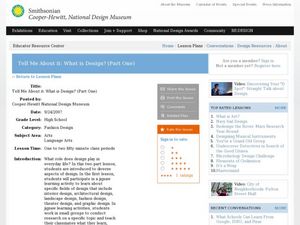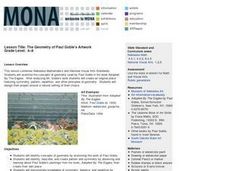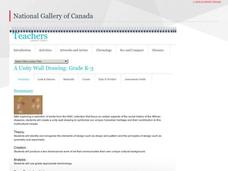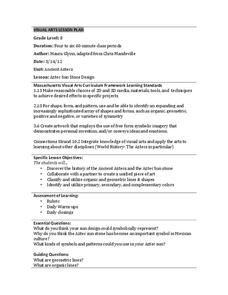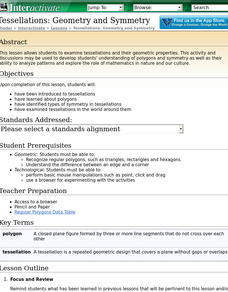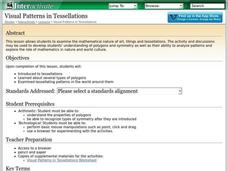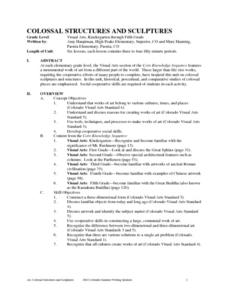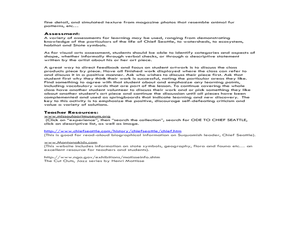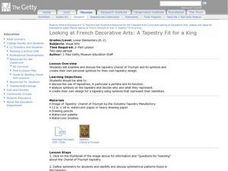Hawaiʻi State Department of Education
Mixed Media Collage
Rhythm, repetition, positive, and negative space is used to create mixed media collages. Let your learners go wild with glue, magazine clippings, and the elements of design. They'll experiment with various types of media, color, and...
Curated OER
Tell Me About It: What is Design?
Students create and present an original design. In this visual arts lesson plan, students watch a video about design and learn the elements of design. Then students work in groups to construct and present an original design.
Curated OER
Patterns & Balance
Students compare and contrast the difference in the two sets of images and discuss the visual interest in the first set and the different visual interest created in the second set of prints.
Curated OER
Suspension Bridge Drawing Lesson
Young scholars study the basic artistic styles of suspension bridges. They follow step-by-step instructions to draw a suspension bridge. Students discover volcabulary related to the architecture of bridges. They examine websites of bridges.
Sargent Art
Color Value Study
I love geometric art because it applies mathematical reasoning to an artistic endeavor. Creative kids use scale values to highlight their complex, repetitive, geometric designs. Symmetry, angles, and congruence are three concepts that...
Curated OER
Face Study: Draw the Other Half
Build fine motor, spatial, and drawing skills by having the class complete the other half of a portrait. They choose an image of a face from a magazine, then attempt to draw the other half of the face as accurately as they can. Two book...
Curated OER
The Geometry of Paul Goble's Artwork
Students examine the concepts of geometry used by Paul Goble in his book Adopted By The Eagles. After analyzing Mr. Goble's work they create an original piece featuring symmetry, pattern, repetition, and other principles of geometry....
Curated OER
Roman and Early Christian Art
Third graders explore pattern, texture, balance, symmetry as they examine Roman and Byzantine art in the four lessons of this unit. Details of the major art works studied are placed into a booklet for presentation to the class.
National Gallery of Canada
The Roots of My Family
Represent family history visually by requiring your young artists to create family trees that express balance and symmetry. Pupils examine works of art, research their family histories, and put together large family tree posters.
National Gallery of Canada
Tantalizing Tessellations!
Examine repeating and intricate patterns with a study of M.C. Escher and a related art activity. Pupils view and discuss the artwork before creating their own tessellating patterns. Step-by-step instructions for creating a template are...
National Gallery of Canada
A Unity Wall Drawing
Build class community with an art project. Learners first examine and discuss works of art. They then contribute to a class mural by tracing their hands and decorating them in relation to their own cultures. The final mural incorporates...
Curated OER
Ancient Aztecs
Is it a calendar? A religious symbol? A political statement? One thing for certain is that Aztec sun stone designs remain an important symbol in Mexican cultural art. Young artists craft their own Aztec Sun design incorporating ideas...
Curated OER
Radial Balance Geometric Shapes
Fifth graders create a radially balanced design using geometric shapes which exhibits their prior knowledge of symmetry. They use a kaleidoscope image to develop a design using markers or colored pencils.
Curated OER
Symmetry
Students make a design with pattern blocks and then pass them on to the rest of the class. They have to make them symmetrical and complete the design.
Curated OER
Geometry and Symmetry
Students examine tessellations and their geometric properties. The lesson plan and discussions may be used to develop students' understanding of polygons and symmetry as well as their ability to analyze patterns.
Shodor Education Foundation
Visual Patterns in Tessellations
Geometers explore the concept of tessellations. They use a tessellation applet to manipulate shapes and design their own tessellation using the applet.
Curated OER
Symmetry: Theory, Reality and Art!
Students explore the concept of geometric symmetry. In this geometric symmetry lesson, students walk around their school and take pictures of objects that demonstrate symmetry. Students use Microsoft Paint to draw the lines of symmetry...
Curated OER
Rainy Day Watercolor
Second graders create a street scene using street pictures for reference. students explore symmetry using watercolors. Students use art mediums to explore the mathematical concept of symmetry.
Curated OER
Castles and Cornerstones
Students become familiar with the style of architecture of medieval times. In this architecture lesson, students design a model of a medieval castle including its cornerstone. Students understand scale in their representation.
Curated OER
Draw A Face
Students discover how to sketch a face. In this sketching lesson, students explore the steps to construct a facial drawing. Spacing and symmetry of facial features are explored.
Curated OER
Composition Compositions
Students explore composition and symmetry to create their own digital media piece. In this design composition lesson, students visit the online websites and examples of asymmetrical compositions and symmetry. Students sketch a...
Curated OER
Colossal Structures and Sculptures
Fifth graders explore the historical, procedural, and comparative studies of colossal sculptures and structures in this six lessons unit. The cooperative efforts of many people to complete the works is emphasized.
Curated OER
Cut Outs: Shapes and Symbols
Students create collages based on Juan Quick-to-See Smith's "Ode to Chief Seattle." In this shapes, symbols and Native American lesson, students examine the "Ode to Chief Seattle" and Henri Matisse's cutout work. Students design their...
Curated OER
Chariot of Triumph
Students examine the tapestry "Chariot of Triumph." In this symbolism lesson, students analyze the symbols in the tapestry and what they represent. Students create their own design for a tapestry by using various symbols that represent...



